Melbourne Royal Show: Everything you need to know
Valais Blacknose sheep have made their first appearance in the Melbourne Royal Sheep Competition. See our coverage of all the action.
Valais Blacknose breeders have set their place at the Melbourne Royal table, after bringing the first genetics to Australia three years’ ago.
Farm Valais stud principal Jane Lauber, from Yarrambat, was one of three competitors in the breed’s first appearance in the Melbourne Royal Show sheep competition.
She was the second breeder in Australia, after first purchasing five ewes and three rams from separate bloodlines. She had embryos made in a genetics centre in the UK, and used Dohne Merinos as surrogates.
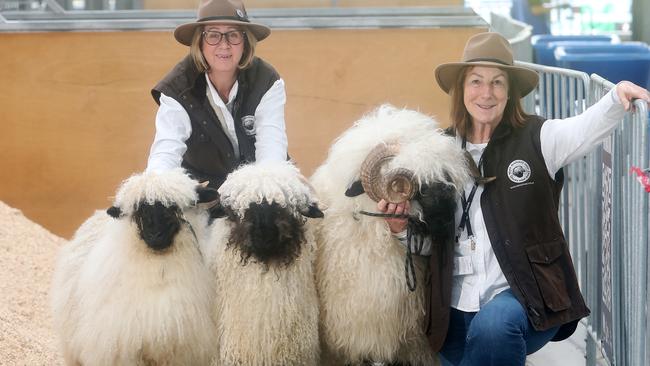
She now has 38 in her flock, and was rapt at the breed’s representation last week.
“It’s the enjoyment of watching children and families be able to touch and enjoy,” she said.
She said she had about six people show interest in purchasing lambs so far.
Malakais Valais Blacknose stud principal Shane Carey from Miners Rest said he started breeding his flock almost three years ago.
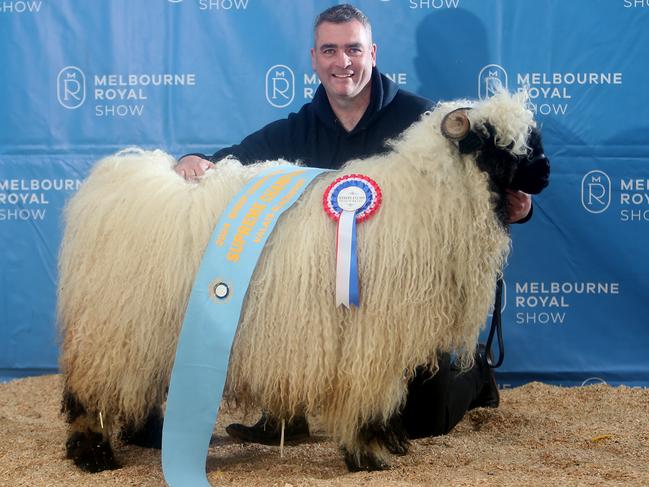
He now has the largest flock in Australia with 80 head, with long-term plans to build to 200 alongside his miniature donkeys, after destocking his 600 alpacas.
Malakais won both grand champion ewe, ram and supreme exhibit at Melbourne.
“We started as soon as they came into the country and have been importing ever since,” he said.
He said they first bought embryos and lambs from Camperdown breeders, and used Border Leicester and White Suffolk sheep as surrogates.
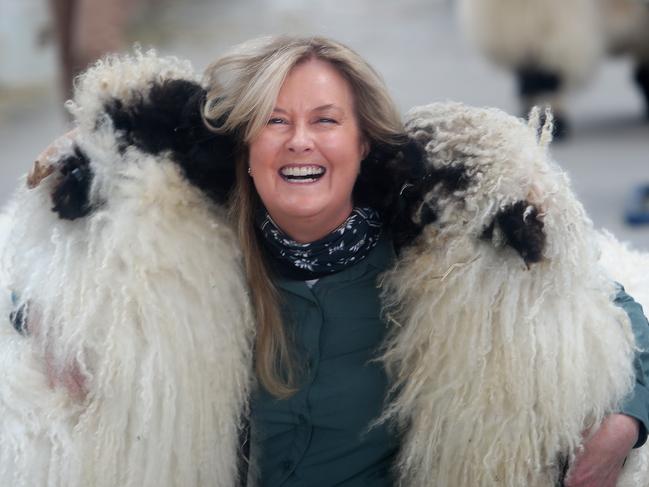
INTERBREED WINNERS:
Corriedales and Suffolks are the champions of this year’s Melbourne Royal Sheep Competition, with the stud principals attributing their success to well-timed trims, beautiful carcass and high-performing genetics.
Sweetfield Corriedale stud principal Bron Ellis, of Mount Moriac, has taken the top accolade with her Corriedale ram Achievement 23-48, winning Interbreed champion ram.
“I often say ‘he’s like a block’, we breed a dual-purpose sheep and I concentrated a lot on carcass,” she said.
“He has even wool from his shoulder to hindquarter, it’s dense, it will cut well so you have weight in it, he’s an all-round, beautiful looking ram.”
Ms Ellis currently manages about 100 ewes and had 165pc lambing rates, which finished in July.
She also won most successful exhibitor, supreme champion Corriedale, Corriedale grand champion ewe, interbreed sire’s progeny, and interbreed breeder’s group.
“Whether the secret is in the trimming I’m not sure, but you have to have the breeding to start with,” she said.
Oberon Suffolk stud principal Bruce Rolfe has bred Suffolks for 25 years, but it was his first time competing at the Melbourne Royal.
He won Interbreed champion ewe with Oberon 3039, which also won first in the August drop ewe class, champion Suffolk ewe, supreme champion Suffolk and interbreed champion shortwool ewe.
“My focus has always been on the ewes and I don’t think many other studs do, they may focus on breeding sires to go on and influence other studs and be used commercially,” he said.
“But when I’ve had good success, it’s with the ewes because I see them as a way to improve my flock.”
ZARA’S PASSION:
A love of animals has led to city-based teenager Zara White caring for the Melbourne Royal Show dairy cattle.
Ascot Vale’s Zara, 13, is volunteering for the second time in the agricultural hub’s Dairy Australia stall at the show this year.
“I love how friendly they are and they understand how you’re feeling, they’re always fun to be around,” she said.
“My parents and I were here for the show [last year] and we saw our family friend was looking after two cows and four calves all by herself. I asked if they wanted some help and came in for the rest of the show to help out.”

Her responsibilities included feeding, cleaning and refilling water for the cattle.
She said her cousins had a farm at Yackandandah, which she enjoyed visiting.
Melbourne Royal Show agriculture general manager Darren Keating said they maintained a strong youth focus this year, and aimed to connect urban life and farming.
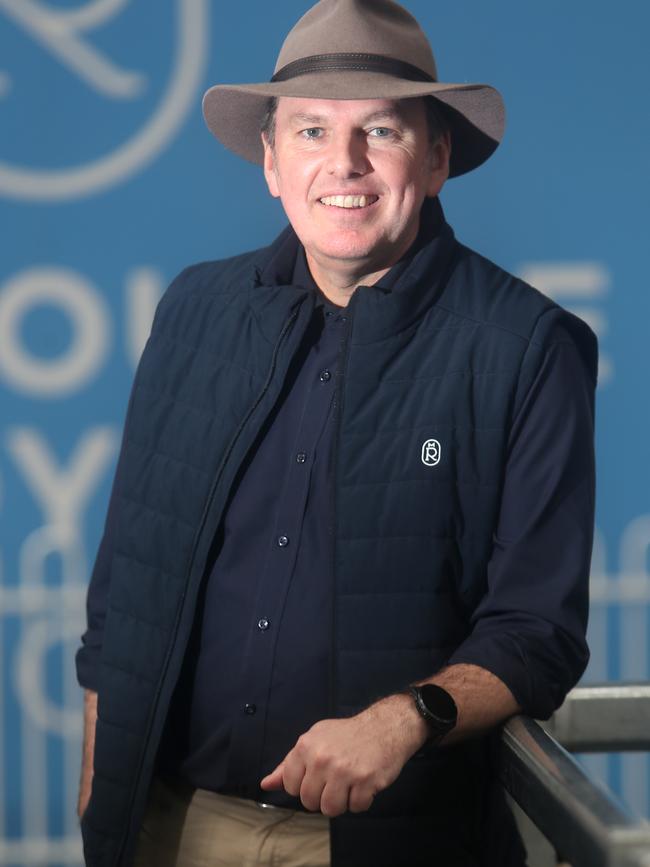
“It’s amazing the way they present themselves, and the way they speak, you get kids who are really confident with animals,” he said.
“It’s the best representation for Victorian agriculture to our community and our urban community who may know nothing about farming, seeing farmers caring and looking after the animals to show what a wonderful industry it is.”
FINLEY HIGH:
The cornerstone of Finley High School’s agricultural program is its community, with students flourishing in its sheep, stud and carcass competitions.
Finley High School agricultural teachers Robyn O’Leary and Gary Webb are working with 33 students at the Melbourne Royal Show this week, alongside 13 sheep, 15 carcass animals, and eight stud cattle.
They lease three blocks of land with about six hectares total.
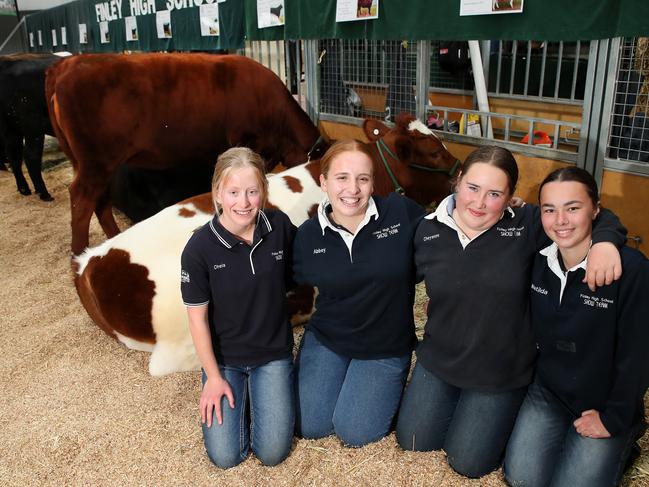
Mr Webb said the surrounding Finley community donated genetics, money, fuel, feed, livestock and time to help the school’s agriculture department flourish.
“Our community must be one of the most supportive communities there is, they help make the show happen,” he said.
The school won Interbreed ram and ewe in 2023, and champion heavy domestic steer. This year they won Poll Dorset supreme champion with a ram, and Poll Dorset grand champion ewe.
He said the students were a passionate group, and start studying agriculture at Year Nine.
“There’s something that really draws them to working with livestock. They’re able to take an animal that’s quite raw, off someone’s farm, they break the animal in, groom it and get it to the point where it can come to the show,” he said.
Mr Webb said about half of the 2025 Year 11 students decided to study Primary Industries.
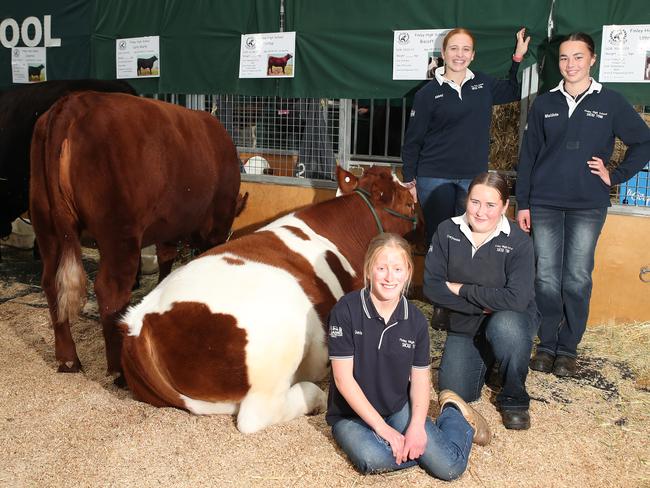
Chelsea Singleton, Year 11, is from a family cropping operation at Blighty near Deniliquin, NSW, and said she wanted to be a teacher after her secondary schooling.
“I love the cattle and the sheep. I love working as a team with my friends to get the cattle ready, and seeing the results in the ring because we work so hard for it as a team,” she said.
Abbey Tanner, Year 8, has about 300 milking cows at her Berrigan family farm, and said she loved making new friends at the show and hoped to be a veterinarian after school.
Matilda Burton, Year 8, said she wanted to continue working with horses after school, which her family had on their farm.
“I love the memories we make and the fun we have, especially being around the animals,” she said.
Cheyenne Tucker, Year 11, said she hoped to be a stock and station agent after finishing school.
“I love everything. Leading the cows and being with the animals,” she said.
SUFFOLKS:
First-time Melbourne Royal sheep competitor Bruce Rolfe has found major benefits in focusing on his ewes in his 25 years’ breeding Suffolks.
Bruce, from Musk near Daylesford, won supreme champion for the Suffolk breed at the Melbourne Royal Show sheep competition on Thursday, with a “beautiful little ewe”.
He said he had great success with his showing team this year, and decided to bring his team to the Melbourne Royal for the first time.
“I view lambing as the way to build my stud. When I have a crop of lambs, the rams are important but I sell them. I keep the best ewes,” he said.
Bruce said he avoided using figures but focused on temperament, mothering and milking ability.

He said the current market had stabilised, but demand for well-bred Suffolks boomed during the Covid-19 pandemic.
“The past year has been quiet and I think that’s because southwest Victoria is having a terrible time,” he said.
Bruce said it was his final show for the year.
“It’s the ewes that are winning for us. We wanted to take advantage of that success in the hope we might get more accolades to show people our sheep are of good quality,” he said.
“When you have champion ewes, it gets people’s attention, they think it must be worth going and having a look at.”
He has sold three stud rams and two flock rams so far, which he said was earlier than his usual selling season that typically starts in November.
Bruce said he also sold lambs to a chef for restaurant use, with feedback they were “far superior” for flavour and tenderness.
“I discovered reasonably early on they weren’t just gorgeous to look at, they have the most delicious meat. The meat is flavoursome, it’s not overwhelmed by fat,” he said.
Other breeds being judged at the show included Border Leicester, Black and Coloured, Lincoln, Southdown, Suffolk and White Dorper.




